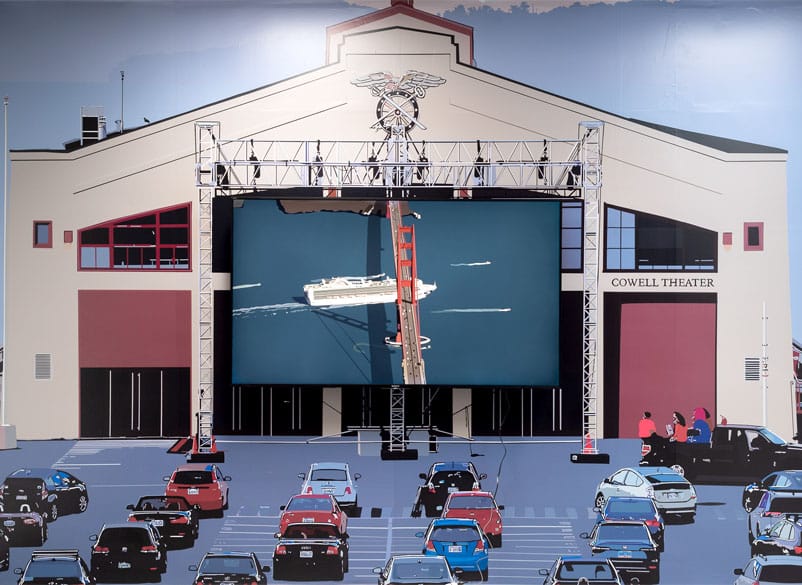Fort Mason Center for Arts & Culture (FMCAC) in collaboration with the San Francisco Museum Of Modern Art (SFMOMA), present San Francisco Bay Area artist Kota Ezawa's new exhibition for Fort Mason Art's annual Gallery 308 program. The exhibition is a deep dive into San Francisco's collective memory, transforming recent Bay Area history into immersive art.
Featuring two major video works and a captivating installation with photographic evidence of a legendary but lost art environment, the show highlights Ezawa's ability to blend historical events with contemporary art practices. Here and There -- Now and Then is the second exhibition collaboration between FMCAC and SFMOMA since their 2015 co-presentation of Janet Cardiff's 40 Part Motet in FMCAC's Gallery 308.
"San Franciscans have lived through extraordinary times - financial boom and bust cycles, wars, global pandemics, cultural upheavals, and struggles for human rights and freedom," said Frank Smigiel, Director of Arts Programming and Partnerships at FMCAC. "Ezawa's work doesn't just remind us of these moments; it invites us to see them anew, finding unexpected connections between crisis and creativity, between our past and our possible futures."
show less
Featuring two major video works and a captivating installation with photographic evidence of a legendary but lost art environment, the show highlights Ezawa's ability to blend historical events with contemporary art practices. Here and There -- Now and Then is the second exhibition collaboration between FMCAC and SFMOMA since their 2015 co-presentation of Janet Cardiff's 40 Part Motet in FMCAC's Gallery 308.
"San Franciscans have lived through extraordinary times - financial boom and bust cycles, wars, global pandemics, cultural upheavals, and struggles for human rights and freedom," said Frank Smigiel, Director of Arts Programming and Partnerships at FMCAC. "Ezawa's work doesn't just remind us of these moments; it invites us to see them anew, finding unexpected connections between crisis and creativity, between our past and our possible futures."
Fort Mason Center for Arts & Culture (FMCAC) in collaboration with the San Francisco Museum Of Modern Art (SFMOMA), present San Francisco Bay Area artist Kota Ezawa's new exhibition for Fort Mason Art's annual Gallery 308 program. The exhibition is a deep dive into San Francisco's collective memory, transforming recent Bay Area history into immersive art.
Featuring two major video works and a captivating installation with photographic evidence of a legendary but lost art environment, the show highlights Ezawa's ability to blend historical events with contemporary art practices. Here and There -- Now and Then is the second exhibition collaboration between FMCAC and SFMOMA since their 2015 co-presentation of Janet Cardiff's 40 Part Motet in FMCAC's Gallery 308.
"San Franciscans have lived through extraordinary times - financial boom and bust cycles, wars, global pandemics, cultural upheavals, and struggles for human rights and freedom," said Frank Smigiel, Director of Arts Programming and Partnerships at FMCAC. "Ezawa's work doesn't just remind us of these moments; it invites us to see them anew, finding unexpected connections between crisis and creativity, between our past and our possible futures."
read more
Featuring two major video works and a captivating installation with photographic evidence of a legendary but lost art environment, the show highlights Ezawa's ability to blend historical events with contemporary art practices. Here and There -- Now and Then is the second exhibition collaboration between FMCAC and SFMOMA since their 2015 co-presentation of Janet Cardiff's 40 Part Motet in FMCAC's Gallery 308.
"San Franciscans have lived through extraordinary times - financial boom and bust cycles, wars, global pandemics, cultural upheavals, and struggles for human rights and freedom," said Frank Smigiel, Director of Arts Programming and Partnerships at FMCAC. "Ezawa's work doesn't just remind us of these moments; it invites us to see them anew, finding unexpected connections between crisis and creativity, between our past and our possible futures."
show less
Date/Times:
Gallery 308
1 Upcoming Events
2 Marina Blvd, Building A, San Francisco, CA 94123
The Best Events
Every Week in Your Inbox
From Our Sponsors
UPCOMING EVENTS
Great suggestion! We'll be in touch.
Event reviewed successfully.









